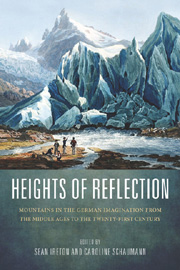 Heights of Reflection
Heights of Reflection Book contents
- Frontmatter
- Contents
- Acknowledgments
- Introduction: The Meaning of Mountains: Geology, History, Culture
- Prelude: Classical Mountain Landscapes and the Language of Ascent
- Part I First Forays: Mountain Exploration and Celebration from the Middle Ages to the Eighteenth Century
- Terra Incognita? Mountains in Medieval and Early Modern German Literature
- From Meadows to Mountaintops: Albrecht von Haller's “Die Alpen”
- Interlude: Geo-Poetics: The Alpine Sublime in Art and Literature, 1779–1860
- Time and Narrative in the Mountain Sublime around 1800
- Faust's Mountains: An Ecocritical Reading of Goethe's Tragedy and Science
- Spectacular Scenery and Slippery Descents: Narrating the Mountains of Tropical Polynesia
- Part II Beckoning Heights: Summits Near and Far in the Nineteenth Century
- Part III Modern Expeditions and Evocations: Climbing from the Twentieth into the Twenty-First Century
- Works Cited
- Notes on the Contributors
- Index
Faust's Mountains: An Ecocritical Reading of Goethe's Tragedy and Science
from Part I - First Forays: Mountain Exploration and Celebration from the Middle Ages to the Eighteenth Century
Published online by Cambridge University Press: 05 February 2013
- Frontmatter
- Contents
- Acknowledgments
- Introduction: The Meaning of Mountains: Geology, History, Culture
- Prelude: Classical Mountain Landscapes and the Language of Ascent
- Part I First Forays: Mountain Exploration and Celebration from the Middle Ages to the Eighteenth Century
- Terra Incognita? Mountains in Medieval and Early Modern German Literature
- From Meadows to Mountaintops: Albrecht von Haller's “Die Alpen”
- Interlude: Geo-Poetics: The Alpine Sublime in Art and Literature, 1779–1860
- Time and Narrative in the Mountain Sublime around 1800
- Faust's Mountains: An Ecocritical Reading of Goethe's Tragedy and Science
- Spectacular Scenery and Slippery Descents: Narrating the Mountains of Tropical Polynesia
- Part II Beckoning Heights: Summits Near and Far in the Nineteenth Century
- Part III Modern Expeditions and Evocations: Climbing from the Twentieth into the Twenty-First Century
- Works Cited
- Notes on the Contributors
- Index
Summary
Ecocriticism's environmental perspective views human beings, bodies, and culture as participants in ecological interactions and exchanges with the rest of the energetic and material world, including both biotic and abiotic forms. This ecocritical essay assesses how Goethe portrays Faust's mountain experiences in both part I and part II (1808, 1832) of the tragedy as engagements with physical matter rather than with spiritual inspiration. Indeed, by using ecocriticism to study Goethe's science as the context for the play, we see that Faust's many mountains are more than a setting; they actively destabilize his — and our — assumptions about “passive matter” and recontextualize human endeavors in their physical environment. Faust's mountains inspire the desire to “ascend,” but they also offer a glimpse into the massive geological changes occurring through deep time even as they radically alter the climatic systems of the biosphere on a daily basis. In other words, scientists in the Age of Goethe recognized that the apparent solidity of mountains is actually a short-term illusion; mountains instead embody and enact climatic and geological flows in which we human beings are not the only active forces. Goethe's Faust documents such issues, though this is often overlooked in readings celebrating human ingenuity and action as the supreme, spiritual, and/or modern force shaping our world for the “better,” regardless of so-called “collateral damage” such as murder, colonialism, piracy, and the final putrid swamp. In contrast, viewing the tragedy through ecocriticism and Goethe's science offers a possible environmental stance acknowledging humanity's position within these many physical processes rather than as transcendental beings who dominate at whim and without long-term costs.
- Type
- Chapter
- Information
- Heights of ReflectionMountains in the German Imagination from the Middle Ages to the Twenty-First Century, pp. 116 - 133Publisher: Boydell & BrewerPrint publication year: 2012


